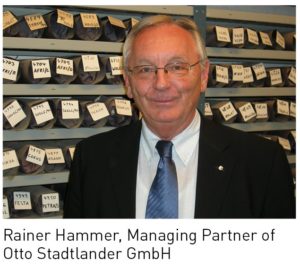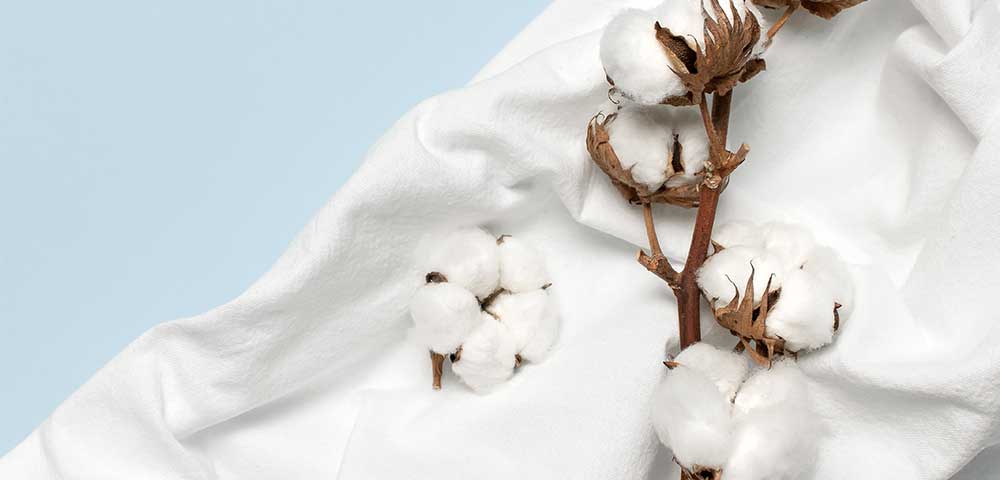Interview with Rainer Hammer, Otto Stadtlander:
 As an owner-managed company, Otto Stadtlander GmbH has played a decisive role in the history of Bremen‘s international cotton trade and the Bremen Cotton Exchange. For more than forty years, there have been links with Israel and the country’s Israel Cotton Production & Marketing Board. Today, in addition to trading in natural fibres from many countries around the world, Otto Stadtlander is the worldwide exclusive distributor of cotton from Israel. The Cotton Report editorial team spoke with Rainer Hammer about the quality of the cooperation with the country and its people. Rainer Hammer is the Managing Partner of the traditional company.
As an owner-managed company, Otto Stadtlander GmbH has played a decisive role in the history of Bremen‘s international cotton trade and the Bremen Cotton Exchange. For more than forty years, there have been links with Israel and the country’s Israel Cotton Production & Marketing Board. Today, in addition to trading in natural fibres from many countries around the world, Otto Stadtlander is the worldwide exclusive distributor of cotton from Israel. The Cotton Report editorial team spoke with Rainer Hammer about the quality of the cooperation with the country and its people. Rainer Hammer is the Managing Partner of the traditional company.
Cotton Report: Mr. Hammer, how long has your company Otto Stadtlander been the exclusive distributor for cotton from Israel?
Rainer Hammer: We have had the contract with the „The Israel Cotton Production & Marketing Board“ (ICB) for the worldwide exclusive marketing of the entire Israeli cotton supply since 2009. All Israeli cotton farmers are organised under the umbrella of the ICB. There has been regular cooperation between the ICB and our company since 1976, so for more than forty years. This is most of my more than 50 years of international cotton trade.
What do you personally value about the cooperation?
Above all, it is the reliability and the direct connection with the partners in the country. Israeli cotton always offers a high level of consistent qual-ity. We buy up the annual cotton production, but as is usual in the cotton trade, we offer the best possible flex-
ibility in terms of price. Producers, on the other hand, offer a lot of willingness to cooperate when it comes to responding to the needs of customers. A good example of this was the rapid change in the packaging material of the cotton bales sold. The strong poly material foils, which are used nowadays instead of jute, have significantly reduced the risks of contamination and damage during storage and transport in the interest of the customer.
How would you describe the intensity of the cooperation?
Initially, there was widespread scepticism among our Israeli partners and farmers about whether exclusive distribution would be permanently effective. Our performance was convincing thanks to our commitment. Today, both sides see the cooperation as an absolute win-win situation. Recently, my son Henning Hammer, in his role as Managing Director of Otto Stadtlander GmbH and responsible for sales in the Far East, travelled with a delegation from Israel to visit major customers in India and China to further develop the business base and discuss common expectations.
What is special about Israeli cotton?
For Israeli cotton farmers, sustainability is not a buzzword. Many years ago, they developed advanced and resource-saving droplet irrigation and water storage methods. The same applies to measures for sustainable, integrated crop protection. The result of this cultivation practice is cotton with a consistently reliable quality, particularly in terms of fibre length and tear strength, and the world‘s highest yields. The basis is a high-quality seed, which is constantly under development. 85 percent of the production consists of high-grade cotton with extremely low contamination levels. Israel is known for its range of extra-long staple Pima cotton. Only a small part consists of long-staple qualities (LS). Each bale delivered is checked and labelled with reliable quality data.
What is the average annual sales volume?
15,000 to 18,000 tonnes of ginned cotton are available per harvest season. Most of this consists of Pima cotton in high quality, with about 2,000 to 3,000 tonnes of LS quality. We sell large quantities of Israeli cotton to China and India, where spinning mill demand for this high-quality cotton product is steadily increasing. Many of the textiles processed from Israeli cotton are sold on via the export route in Europe. In this respect, our sales activities also follow the changes within the global textile procurement chain.
What is the importance of Israel’s co-operation with the Better Cotton Initiative (BCI)?
Israeli cotton has been certified according to the standards of the Better Cotton Initiative since 2015/16. In view of the well-known reliability concerning the quality of the cotton and the permanent work on the sustainable further development of cotton cultivation, the decision to cooperate with the BCI was a logical and consistent step. In the end, it was easy to meet the criteria for cooperation based on the level that had already been achieved. Independently, we also find that retail companies more than ever rely on established sustainability standards in the procurement of textile products, which begins with the raw material cotton. This type of customer especially uses BCI-certified qualities to market their finished products as credibly sustainable to the end user.
Thank you for the interview.
Interviews embody the opinion of the respective interview partner and do not represent the position of the Bremen Cotton Exchange as neutral, independent institution.

